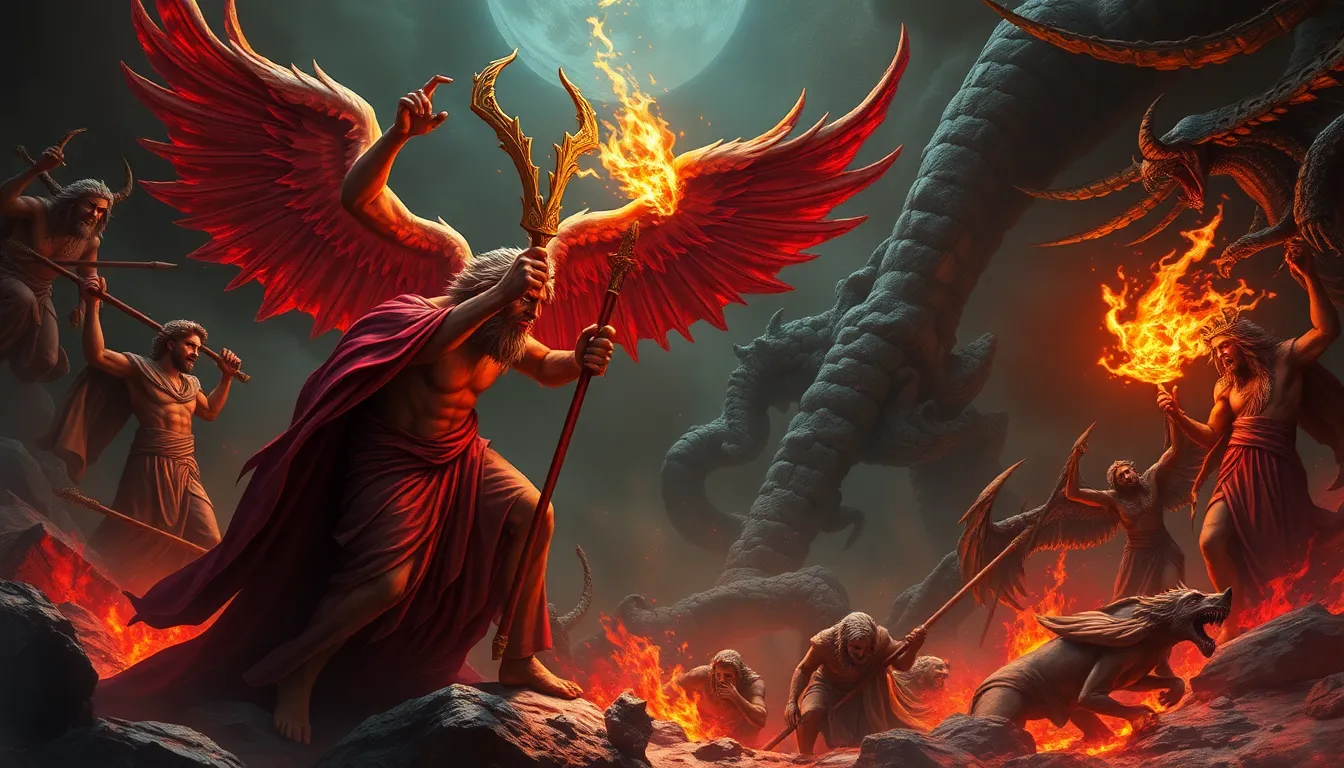The Role of Divine Retribution in the Myths of the Underworld Gods
I. Introduction
Divine retribution is a concept that denotes the punishment or reward administered by a higher power in response to human actions, often reflecting the moral order of the universe. In the realm of mythology, especially within the context of the Underworld, this theme becomes particularly pronounced. The Underworld serves as a pivotal location in various mythologies, where souls are judged and dealt with according to their deeds during life. Understanding the role of divine retribution in these myths is crucial for grasping the broader themes of justice and morality that pervade ancient cultures.
II. Historical Context of Underworld Myths
The beliefs regarding the afterlife have varied significantly across ancient civilizations. The Underworld is often depicted as a realm where the souls of the deceased reside, managed by powerful deities responsible for their fate.
- Ancient Civilizations: Cultures such as the Greeks, Egyptians, and Hindus developed intricate beliefs about life after death, which included detailed descriptions of the Underworld.
- Key Underworld Gods: Prominent deities such as Hades (Greek), Osiris (Egyptian), and Yama (Hindu) played crucial roles in governing the afterlife and administering divine justice.
- Evolution of Myths: Over time, these myths evolved, reflecting changing societal values and beliefs about morality and justice.
III. Divine Retribution: Concept and Significance
Divine retribution in mythology often serves as a moral compass, guiding individuals on how to live their lives. It embodies the idea that actions have consequences, and that a higher power ensures justice is served.
- Moral Implications: The narratives surrounding divine retribution often emphasize the importance of moral behavior, as they serve to reinforce societal norms.
- Comparative Justice: The concept of divine retribution contrasts with human concepts of justice, often highlighting the limitations and imperfections of human judgment.
IV. Case Studies of Underworld Gods and Their Retributive Roles
Various Underworld deities embody the theme of divine retribution in their narratives. Below are notable examples:
- Hades: In Greek mythology, Hades rules the Underworld and ensures that souls receive their due rewards or punishments based on their earthly deeds. His realm contains both Elysium, for the virtuous, and Tartarus, for the wicked.
- Osiris: The Egyptian god Osiris presides over the afterlife, where he judges souls based on their hearts’ weight against the feather of Ma’at, the goddess of truth and justice. This judgment determines whether they are granted eternal life or face annihilation.
- Yama: In Hindu mythology, Yama is the god of death who oversees the souls of the deceased. He assesses their actions to determine their next incarnation, emphasizing the cyclical nature of life, death, and rebirth.
- Other Notable Examples: Various cultures feature similar deities, such as Anubis in Egyptian mythology, who guides souls to their judgment, or the Aztec god Mictlantecuhtli, who rules over the realm of the dead.
V. Symbolism of Punishment and Reward in the Underworld
The Underworld’s portrayal in mythology often symbolizes a broader duality of punishment and reward, reflecting the moral framework of the society.
- Duality of Beliefs: Many cultures believed that virtuous souls would be rewarded in the afterlife, while those who lived immorally would suffer consequences.
- Symbolic Landscapes: The landscapes of the Underworld—be it the tormenting flames of Tartarus or the serene fields of Elysium—serve as powerful symbols of the souls’ fates.
- Role of Judgment: The process of judgment in the Underworld is a significant theme, as it underscores the importance of accountability for one’s actions.
VI. The Psychological and Social Functions of Divine Retribution
The belief in divine retribution plays a crucial role in reinforcing societal norms and ethics, influencing both individual behavior and collective cultural narratives.
- Reinforcement of Norms: Myths of divine retribution serve to uphold societal values, encouraging individuals to act in accordance with shared moral codes.
- Psychological Effects: The belief in a higher power administering justice can provide comfort and a sense of order in an unpredictable world.
- Cultural Narratives: Stories of divine retribution have been pivotal in shaping cultural narratives, influencing literature, art, and moral teachings throughout history.
VII. Contemporary Interpretations of Underworld Myths
The rich tapestry of Underworld myths continues to inspire modern adaptations and retellings, reflecting their ongoing relevance.
- Modern Adaptations: Contemporary literature, film, and art frequently draw upon ancient myths to explore themes of justice, morality, and the human experience.
- Relevance Today: The concept of divine retribution remains pertinent in discussions of morality, ethics, and justice in modern society.
- Critical Perspectives: Modern critiques of retributive justice challenge the morality of vengeance and punishment, prompting discussions about rehabilitation and forgiveness.
VIII. Conclusion
In summary, the role of divine retribution in the myths of Underworld gods offers profound insights into ancient beliefs about justice and morality. These narratives serve not only as cautionary tales but also as reflections of the cultural values of their time.
The enduring legacy of these myths continues to shape our understanding of moral conduct and the consequences of human actions. Ultimately, the exploration of divine retribution in mythology invites us to reflect on our own beliefs about justice and the nature of human existence.




